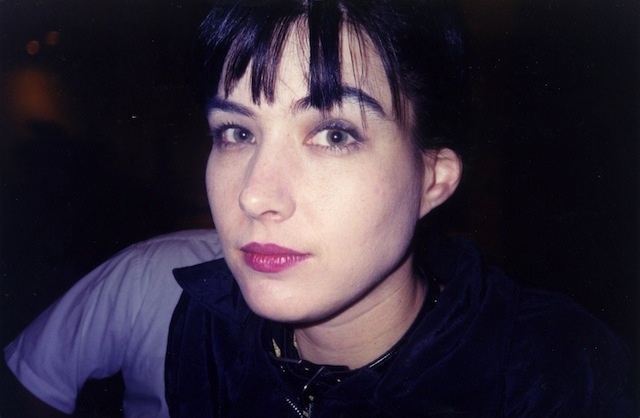
Advertisement
Kathleen Hanna:How are you doing today?Terrible.
Do you want to talk about it?No.
Are you sure?Yes. I could get into it, but there’s no point. I’d tell you about working on a resume all day for some job at an ice skating rink, but that would make for rather boring commentary, wouldn’t it? I’m failing to compete with 17-year-olds.
Bummer. I’ve been thinking about writing a resume. I was looking at being a teacher at the Clive Davis Institute of Recorded Music where I would help students improve their performance techniques. I kept thinking about how I would do that. I mean, what would I say? “Have charisma. You should all wear crowns.”Speaking of charisma, who is your favorite lead singer of Black Flag?
[Extremely long pause] I can’t say. What’s that one guy’s name? See, I know Henry, but… he wasn’t my favorite. He’ll probably find out, but he’s a nice guy and won’t care. So I’d say that first guy whose name I can’t remember.
Advertisement
If you think about it, it’s kind of unheard of for a good band to have more than one good lead singer. Actually, I almost tried out for the Misfits when they tried to reform. I think I have a total Misfits voice, and seriously, I could have done it. It was right at the tail end of Bikini Kill, and I was like, Do I keep doing Bikini Kill for the rest of the year or do I try out for the Misfits? I was convinced I was going to be picked.It would have been badass.
It would have totally been badass! It would have changed the course of my history at least. If I showed up and it was all dudes, it would have been really funny. I would have stood out.How do you feel about bands like the Dwarves?
Oh, the Dwarves… you know that album cover from Blood Guts & Pussy?Yes.
Actually, do you know Corin Tucker? She was one of the singers from Sleater-Kinney and Heavens to Betsy, total Riot Grrrl bands from Olympia in the 90s. Corin had this really beautiful voice that made us all cry. But anyways, she was a 17 or 18-year-old college student making a video and she interviewed Bikini Kill and did not like us. She saw us as selfish because we were feminists and we were doing this thing that was pro-women—at least that’s what I felt when I first met her.I watched her feelings about us change while we were doing the interview. She was actually listening to our ideas and was like, “Wait a minute, I’m a feminist, I actually have felt these same kinds of things…” So she changed her movie to be about the cover of Blood Guts & Pussy. She interviewed all the female bands that were around the scene about it. She’d hold up the cover and everyone would talk about it.
Advertisement

I knew so many men who wanted to get into arguments about feminism just because it was funny to them. They’d be like, “I’m just being a devil’s advocate here,” and I’d say, “You don’t understand. I live this, and it’s not funny to me.”
Advertisement
I didn’t craft the narrative, which was very weird. I just kept reminding myself that it was Sini and Tamara’s movie, and it was gonna be whatever they decided it was gonna be. I tried to be kind of tight lipped about it. I don’t have any perspective on myself. You know, a lot of times before I go on stage I’ll ask my best friend Kathy what I should wear and I’ll just do it because I don’t have any perspective on what looks good on me and what doesn’t. I kind of had the same take on the movie. I didn’t have any perspective on what my story is, so I just let them go at it.The only things I was kind of freaked out about was a) that shitty spoken word at the beginning, which makes me cringe, and b) the one part where I talk about my mom, the trusting thing.[Editor’s Note: In the movie, Kathleen talks about her and her mother’s somewhat sadistic relationship by describing a scene where the two play a trust game. Kathleen lets herself fall backwards expecting her mother to catch her, but instead her mother lets her fall to the ground. Lying there, she looked up to see her mother laughing. At this point her mother remarked, “Let that be a lesson to you. Don’t trust anyone, not even your own mother.”]I told my therapist that story and she was like, “That’s so messed up, it explains why you’re fucked up.” And I was laughing. Every time I’ve told that story I’ve laughed because I think it’s very funny that a grown woman would do that to a child. My mom was the type of person who was always almost pointing at herself, saying, “Who let me be a mom?” She was cool and I always understood her sense of humor. So I made them add a voiceover of me saying something stupid like, “She’s actually really awesome and I love her a lot.” I had to put something in that didn’t make it look like my mom was abusive, because she wasn’t.
Advertisement
I do, too! Nobody else does.I wrote something down like, “I wish somebody had taught me that lesson before I met my ex-girlfriend.”
Don’t trust anyone, not even your own mom.Here’s a question nobody wanted me to ask you: What do you think about death?
Oh, that’s a great question. I think it’s like a portal that you can go through to get out if you want, and it’s in every room—at least I see it in every room. That doesn’t mean I’m suicidal, it just means there’s always an escape route. Maybe that’s totally fucked up, but I think death is an escape route if you need it. It’s like an eject button. But I’m a control freak, so I always see myself as the one who makes the decision in the end. But that’s a really weird question because I honestly do see it as a tunnel.I wonder how that’s going to read?
Just draw a picture of a hole in a wall.How often do you think about death?
Well, not as much as I used to, but when I was sick I thought about it all the time. That’s when the portal ideas started going in my head. When you’re in an extreme amount of pain constantly, you become a totally different person. You start thinking to yourself, How can I make this stop? I was taking all this medication, marijuana pills, anything to make it stop, and it wasn’t working. So I’m like, there’s one way that I can make this stop. I had to believe that at some point I could make it through it, but knowing the portal was there was very helpful. I felt if it came down to it, I could make that choice.
Advertisement
You. [Laughs]Do you still feel like you’re being attacked?
No—and you don’t make me angry, I just thought it was a funny thing to say. Things have really come around. People have been super cool. I feel like I got a lot of shit in the 90s from all sides, from asshole feminists who resented me and the attention I was getting, from dudes who didn’t want the punk scene to include women, from asshole journalists who just talked about our butts and what we were wearing, to people who wrote fanzines and wrote that same shit. What’s the difference between the mainstream and the underground if the fanzines are writing the same exact stuff Rolling Stone is writing?I feel 20 years later, people are like, “Wow, that mattered, that was cool,” and I’m getting the kind of positive attention that I didn’t get back then. So when people are like, “Oh, that’s just nostalgia, that’s why people care about the grunge scene,” I’m like, “I don’t give a shit.” I just like feeling appreciated because at the time we weren’t appreciated, and people would throw shit at our heads while we were playing, and it was really, really hard. So I’m stoked.The Julie Ruin’s song “Girls Like Us” reminds me of “Typical Girls” from the Slits…
Yes, but, I think “Typical Girls” is more making fun of girls who read magazines, put lipstick on, and stuff like that. I never liked that divide. I never liked the whole “we’re the cool girls who play music and you’re the stupid girls who go to the mall,” because I was the stupid girl who went to the mall and then later got into music. I feel like “Girls Like Us” is a statement that there’s no unity. And there shouldn’t be unity. There are no “girls like us.” All the shit in that song is totally abstract and doesn’t make any sense, and I guess in a lot of ways that is a tribute to the Slits. A lot of Ari’s lyrics were pretty fucking weird… She was a fucking weird person.Miley Cyrus recently called herself one of the biggest feminists in the world. Is she?
I love that. I have no idea. What do you think?I don’t know.
I don’t know either. I mean, I feel like it’s cool that she’s this young girl that calls herself a feminist, but… do we want her in our club? [Laughs] Have you seen the new Lily Allen video? I’d suggest you watch that.@countslackula
